Happy Monday! Former President Donald Trump seems to have revealed his nickname for Minnesota Gov. Tim Walz: “Tampon Tim.” The moniker, which others on the right have used, is a reference to a bill Walz signed that Trump has said mandated Minnesota school districts place menstrual products in boys’ bathrooms—though the reality is a bit more nuanced.
Up to Speed
- Independent presidential candidate Robert F. Kennedy Jr. suspended his campaign for the White House and endorsed former President Donald Trump on Friday. Kennedy appeared onstage with Trump at a rally in Arizona after his campaign said he would seek to remove his name from the ballot in several key battleground states (although it may be too late to do so in states like Michigan, Nevada, and Wisconsin). In his brief remarks in Arizona, Kennedy talked about his various concerns about free speech, the state of the Democratic Party, and toxic chemicals in food. “Don’t you want a president that’s going to make America healthy again?” he said to cheers.
- Trump drew the ire of some pro-life commentators Friday after he declared, “My Administration will be great for women and their reproductive rights” in a Truth Social post. Asked later that day if the post represented a change in his stance on abortion, Trump gave a rambling answer in which he reiterated his desire to bring the issue to the states. “I’m very strong on women’s reproductive rights, the IVF, very strong. I mean, we’re leaders in it, and I think people are seeing that,” he said at a press conference in Nevada. “And votes are being taken, and that’s what they’ve wanted. For years, for 52 years, they’ve wanted votes to be taken by the states, and they wanted Roe v. Wade to be brought into the states.”
- Then, on Sunday, Trump’s running mate, Sen. J.D. Vance of Ohio, said the former president would veto a national abortion ban if it made it to his desk. “He would not support it. … If you’re not supporting it as the president of the United States, you fundamentally have to veto it,” he told NBC’s Kristen Welker on Meet the Press. After Welker asked him more directly if Trump would veto a ban, Vance replied: “I think he would. He’s said that explicitly, that he would.”
- Trump also suggested that he would drop out of the September 10 debate with Vice President Kamala Harris that’s set to be hosted by ABC. “I watched ABC FAKE NEWS this morning, both lightweight reporter Jonathan Carl’s(K?) ridiculous and biased interview of Tom Cotton (who was fantastic!), and their so-called Panel of Trump Haters, and I ask, why would I do the Debate against Kamala Harris on that network?” he said in a Truth Social post Sunday night, telling readers to “stay tuned.” Politico reported Monday morning that a dispute had arisen between the two campaigns over whether both candidates’ microphones should stay on during the debate. Where President Joe Biden demanded candidates’ microphones be muted when they were not speaking, Harris is now asking that the microphones stay hot the whole time. In response to a question from a reporter Monday, Trump said he would rather the microphones be on, but added that he did not want the rules to change. “We agreed to the same rules, same rules and same specifications, and I think that’s probably what it should be,” he said. Trump previously backed out of the ABC debate he had agreed to do with Biden after Harris entered the race, only to recommit to it less than a week later.
- ActBlue, the primary fundraising platform for small-dollar donors to give to Democratic candidates, said Friday that it raised more than $100 million during the week of the party’s convention, with $7.2 million coming during the hour that Harris gave her nomination acceptance speech.
- Alaska Lt. Gov. Nancy Dahlstrom dropped out of the race for the state’s at-large House district Friday after finishing third in last week’s nonpartisan primary, in which the top four finishers advance to the ranked-choice general election. Republican leaders in Alaska had feared having multiple Republicans on the ballot in the fall might split the GOP vote and help Democratic incumbent Rep. Mary Peltola, who finished first. Second-place finisher Nick Begich, who lost to Peltola in the 2022 midterms, had vowed to leave the race if he finished behind Dahlstrom, who had endorsements from both Trump and Speaker of the House Mike Johnson. The race for the fourth-place finisher was too close to call as of Monday, with Republican Matthew Salisbury and John Wayne Howe of the Alaska Independence Party receiving about 0.6 percent, tens of thousands of votes behind the top three finishers.
Out of the Spotlight, Democrats Dream of Restructuring the High Court
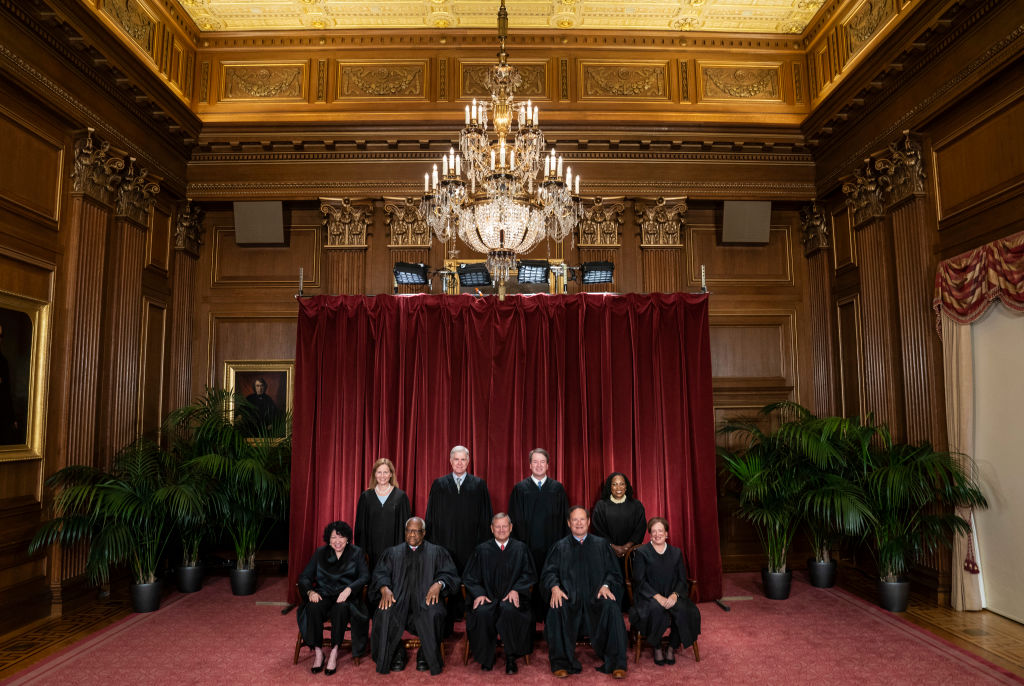
CHICAGO—The Democratic National Convention closed out Thursday night with Vice President Kamala Harris portraying herself as a centrist who would cut middle-class taxes, curb illegal immigration, and “be a president for all Americans.” But off center stage earlier that day, two powerful congressional Democrats, Sen. Sheldon Whitehouse of Rhode Island and Rep. Jamie Raskin of Maryland, appeared on a panel where they discussed plans for a more partisan and progressive agenda if their party controls the White House and Congress next year.
If Democrats capture the White House, the Senate, and the House of Representatives, Whitehouse said, Senate Democrats would be “virtually certain” to pass a “Supreme Court reform” bill by a simple majority, evading the current 60-vote requirement for legislation. The senator said Democrats would tie their Supreme Court legislation—imposing 18-year term limits for Supreme Court justices and establishing ethics and recusal rules—to an omnibus package that would include a bill creating a national right to abortion and other top Democratic priorities.
“To get around the filibuster, we’re going to have to have a process that allows very substantial debate from the Senate minority,” Whitehouse said at an event hosted in Chicago by the Brennan Center for Justice. “We are not going to want to give the Republicans multiple stalls, multiple filibusters on this, so the bill that gets around the filibuster will be virtually certain to include permanent reproductive rights, permanent restored voting rights, getting rid of corrupting billionaire dark money, and Supreme Court reform. If you’ve got a bill like that moving, that’s going to have spectacular tailwinds behind it.”
Last month, Harris and President Joe Biden called for establishing 18-year term limits for Supreme Court justices and giving presidents a new Supreme Court appointment every two years. Biden and Harris provided few details about how their plan would work, refusing to say explicitly whether they would pursue term limits by legislation rather than by a constitutional amendment.
Whitehouse told Dispatch Politics on Thursday that he expects Harris will support legislation to enact Supreme Court term limits. “They have not gone so far as to say, ‘We endorse your bill.’ They have said that your bills are precisely aligned with what we are talking about,” he said when asked if he had received any formal indication from Harris’s campaign that the vice president supports his term-limit legislation.
As chairman of the Senate judiciary subcommittee on the courts, Whitehouse introduced a bill last year that would create the same 18-year term limits and biennial presidential appointment pattern Biden proposed. Only the nine most recently appointed justices would be allowed to vote in almost all of the important cases, meaning that if the bill were enacted tomorrow the winner of the presidential election would effectively be able to replace Justice Clarence Thomas in 2025 and Chief Justice John Roberts in 2027.
Whitehouse’s Supreme Court term limits bill in its current form requires an intervening presidential election before taking effect, but the senator was noncommittal when asked if that’s an essential piece of the legislation. “Everything is subject to the will of the Senate and the House and the input from the president as we do these things,” Whitehouse told Dispatch Politics. “The point of that is that we want to make it seem a little bit less like it’s an immediate targeting” of Supreme Court justices.
Conservatives have disputed the constitutionality of Whitehouse’s bill, which faces some skepticism even inside the Democratic Party. Adam White, a legal scholar at the American Enterprise Institute who was appointed by Biden to the Presidential Commission on the Supreme Court, wrote for The Dispatch last month that any “legislation purporting to strip individual justices of their duties would be unconstitutional” and amount to “court-packing by another name.”
Maine Sen. Angus King, an independent who caucuses with the Democrats, told The Dispatch last month: “I think it has to be a constitutional change.” But Whitehouse said on Thursday he thinks he will be able to convince his colleagues that his legislation is constitutional.
Whether Democrats control the Senate in 2025 could depend on the outcome of the Senate race in Montana, where incumbent Democrat Jon Tester narrowly trailed Republican Tim Sheehy 48 percent to 46 percent in an early August poll conducted by Emerson College. In every other race in which a Democratic seat is in play in 2024, the Democratic candidate currently leads in the polls.
In comments to reporters last week, Senate Majority Leader Chuck Schumer said he was confident that in a 50-50 Senate with the tie-breaking vote of a Vice President Tim Walz, the Senate would change filibuster rules next year. In 2022, Schumer held a vote to bypass the 60-vote rule in order to pass the John Lewis Voting Rights Advancement Act by a simple majority, but Democrats Joe Manchin of West Virginia and Kyrsten Sinema of Arizona opposed changing the rules. “Sinema and Manchin voted no; that’s why we couldn’t change the rules. Well, they’re both gone,” Schumer told reporters last week while previewing a legislative agenda for 2025. Schumer was not asked about Supreme Court reform, but said the party will discuss also changing filibuster rules to enact federal abortion legislation.
When the moderator at Thursday’s Supreme Court panel asked why there had been so little talk of court reform from speakers at the Democratic convention, Raskin said that he submitted a 5,000-word speech to convention organizers, mostly focused on the Supreme Court, but was asked to cut it down to 500 words. “There was a half sentence where I described them as the kangaroo Supreme Court, and I got that in, but that was all I could get,” Raskin said.
“The most important thing that we can do is introduce Kamala Harris and Tim Walz to the American people as people,” Whitehouse said. “We’re not talking about climate change here. We’re not talking about the court capture here, because we’re doing something different here in order to make sure that we have the best launch after an outstanding month to get through to November.”
Harris’ Convention Week Money Haul Gives Her Lots of Options
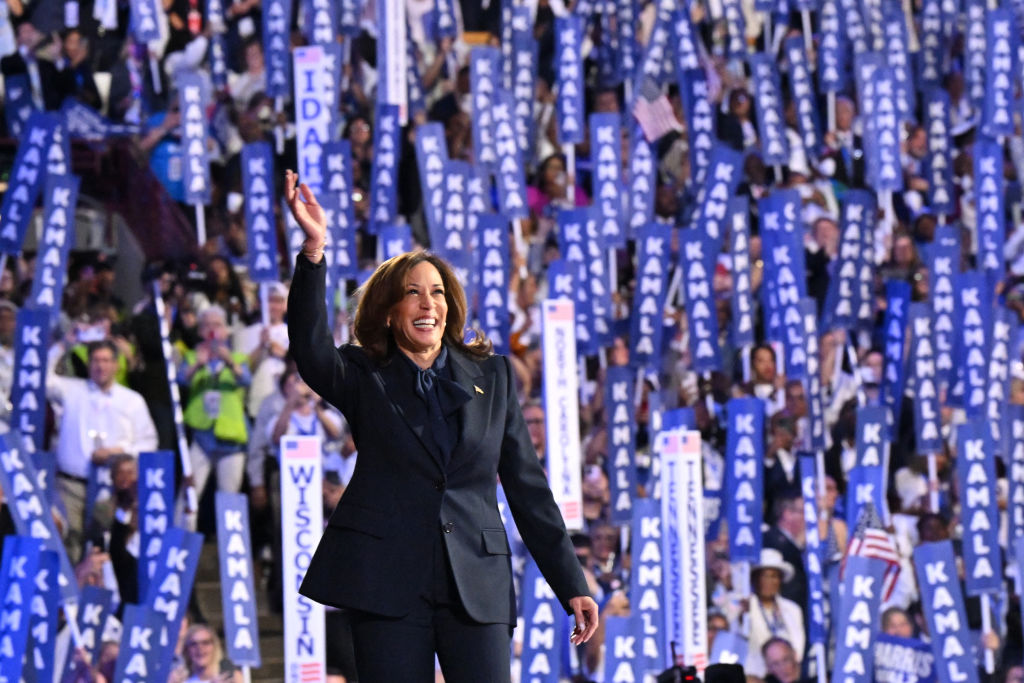
In a lengthy public memo on the state of the 2024 presidential race released Sunday, the campaign manager for Kamala Harris included an eye-popping fundraising number.
“In just over a month since we launched our campaign, Team Harris-Walz raised $540 million - a record for any campaign in history,” wrote Jen O’Malley Dillon. She went on to say the campaign’s coffers crossed the $500 million mark just before Harris spoke Thursday night at the Democratic National Convention, with the New York Times reporting that the campaign raised a total of $82 million during the week of the convention.
“Immediately after her speech, we saw our best fundraising hour since launch day,” O’Malley Dillon added.
The impressive figure caps off a successful week in Chicago for Harris and her running mate, Gov. Tim Walz, as well as a successful month since the vice president entered the race. Harris’ quick and easy clearing of the Democratic field after President Joe Biden withdrew last month, the enthusiastic reception she received at the DNC, and this influx of money underscore how fired up the Democratic Party is for their new nominee as the final stage of the 2024 election approaches.
A post-convention bounce for the vice president would be icing on the cake, though there may not be any room for much more growth in the polls. Since July 24, Harris has gone from a lead of less than a point over former President Donald Trump to a 3.4-point advantage, according to the FiveThirtyEight polling average. Those numbers have not yet factored in Robert F. Kennedy Jr.’s suspension of his campaign and endorsement of Trump; the Kennedy family scion was registering somewhere between 4.5 percent and 6 percent in the same polling average over the course of the last month.
And what will matter more than a bounce in the national polls is how Harris performs in key swing states. Here’s how she and Trump sit post-convention in all seven of them:
- Arizona: Harris +1.2 points
- Georgia: Trump +0.7 points
- Michigan: Harris +2.9 points
- Nevada: Harris +0.5 points
- North Carolina: Even
- Pennsylvania: Harris +1.6 points
- Wisconsin: Harris +3.6 points
And this is where Harris’ massive money haul could be a decisive factor. While a fundraising advantage is no guarantee of victory—Hillary Clinton far outraised and outspent Trump in 2016, for instance—it does allow the better-resourced candidate to play offense rather than defense. The Democratic ticket can boost itself through TV and digital ads in the must-win states of Michigan, Wisconsin, and Pennsylvania, where Harris and Walz already enjoy their largest leads among the swing states.
But with the kind of cash Harris’ campaign is working with, the campaign can also play ball in those Sun Belt states that Trump and the GOP thought they had sewn up when their rival was a flailing Biden. But what if the Trump campaign, which reported starting the month of August with a not-too-shabby figure of $327 million cash on hand, is forced to divert some of those precious dollars to defend its position in, say, North Carolina, which Democrats have won at the presidential level only once in the last 11 elections? Better fundraising means better positioning.
The polls and the money are two factors to watch here, but so is the expenditure of the most precious resource a presidential campaign has: its candidate’s time. Watching where both Harris and Trump appear on the trail will be instructive in the coming weeks. The vice president will make a long-awaited campaign stop in Savannah this week, her second trip to Georgia since launching her campaign. Trump, on the other hand, will be in La Crosse, Wisconsin, on the same day, followed by a rally in Johnstown, Pennsylvania.
Notable and Quotable
“Okay, maybe she has changed her position on things like taking away your health insurance or confiscating your gun. If she has changed her position, she owes it to the American people to come out and say in her own words when she changed and why she changed.”
—Republican Sen. Tom Cotton of Arkansas, to ABC News’ Jonathan Karl on Vice President Kamala Harris’ policy positions, August 25, 2024.



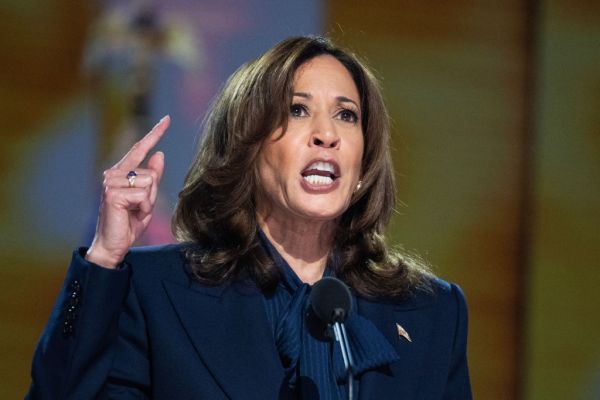
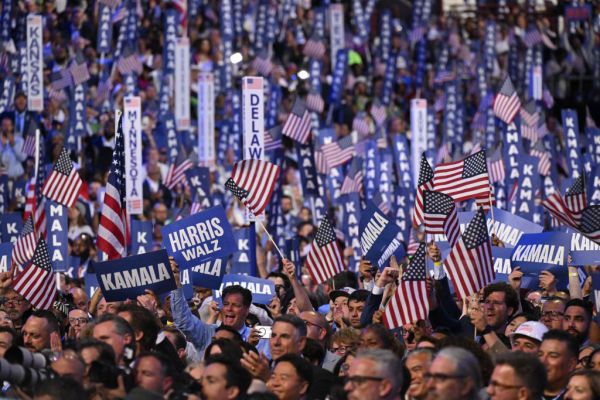
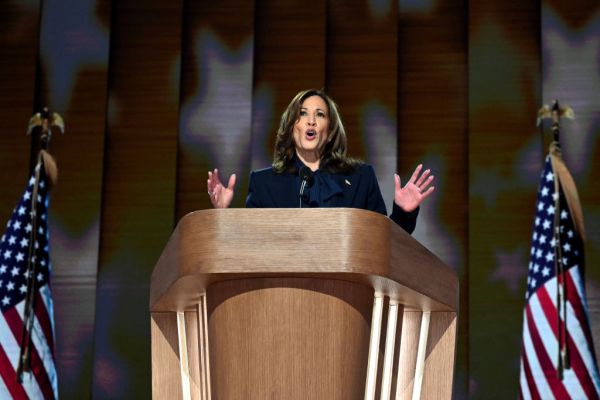

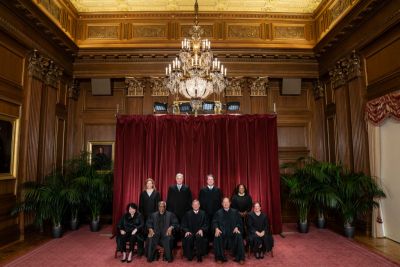
Please note that we at The Dispatch hold ourselves, our work, and our commenters to a higher standard than other places on the internet. We welcome comments that foster genuine debate or discussion—including comments critical of us or our work—but responses that include ad hominem attacks on fellow Dispatch members or are intended to stoke fear and anger may be moderated.
With your membership, you only have the ability to comment on The Morning Dispatch articles. Consider upgrading to join the conversation everywhere.